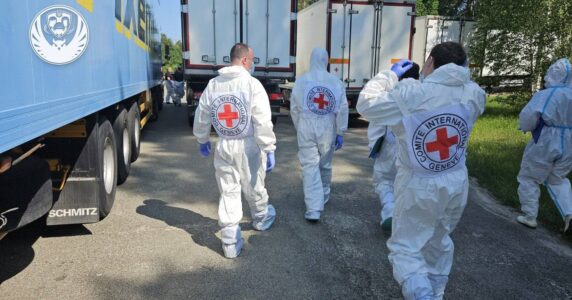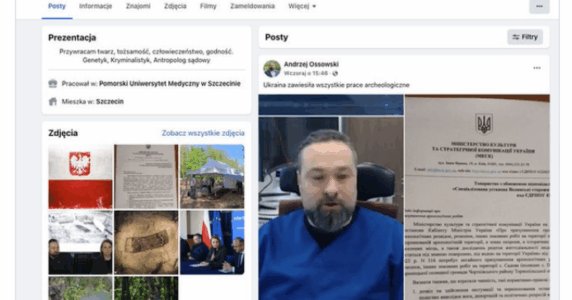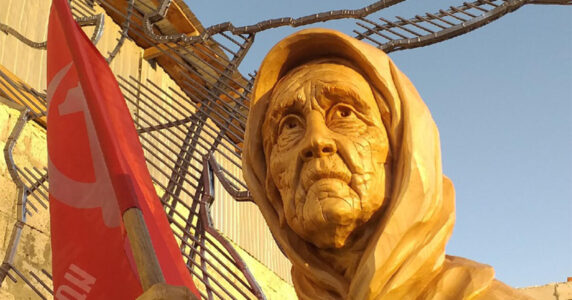Navigation and useful materials
In Russian propaganda, “May 9,” that is, Victory Day over Nazi Germany, takes a prominent place: propagandists sacralize it and elevate the role of the USSR; everyone who disagrees is called a “Russophobe” and “fascist.” However, those who still scream about their “deeds” in World War II, have themselves started and are waging a war against Ukraine and the entire democratic world.
How does Russian propaganda frame its disinformation campaigns about “May 9”?
As a rule, Russian narratives and messages about “May 9” are cyclical, that is, the same statements are reproduced every year. Only local and time contexts (which relate to current events) are considered.
In particular, Russian propaganda, already in March-April of this year, began to spread frames for the further campaign on “May 9,” which focus on the context of the war against Ukraine.
For example, in April, the “Pridnestrovets” Telegram channel published a post stating that allegedly “Ukrainians are going to attack Red Square in Moscow on May 9.” According to the “Without Lie” project, in fact, propagandists used the video of “ICTV Facts,” which is in the public domain. However, neither the caption to the real video nor the video itself says anything about the “attack.”

Before that, in March, Russian propaganda used a draft law on amending Article 73 of the Labour Code of Ukraine to establish non-working festive days for its manipulations and stated that instead of May 9, Ukraine introduced a new festive day — Victory over Muscovy. StopFake also refuted this “information,” explaining that the draft law, which has not yet been put to a vote in parliament, proposes not to cancel the existing festive days, but only to establish other non-working ones. In particular, the authors of the document want to introduce a “Day of Peace” on September 21 to celebrate “peaceful life after Ukraine’s victory over Russian military aggression” on this day. May 9 is proposed to keep a festive, but a working day.
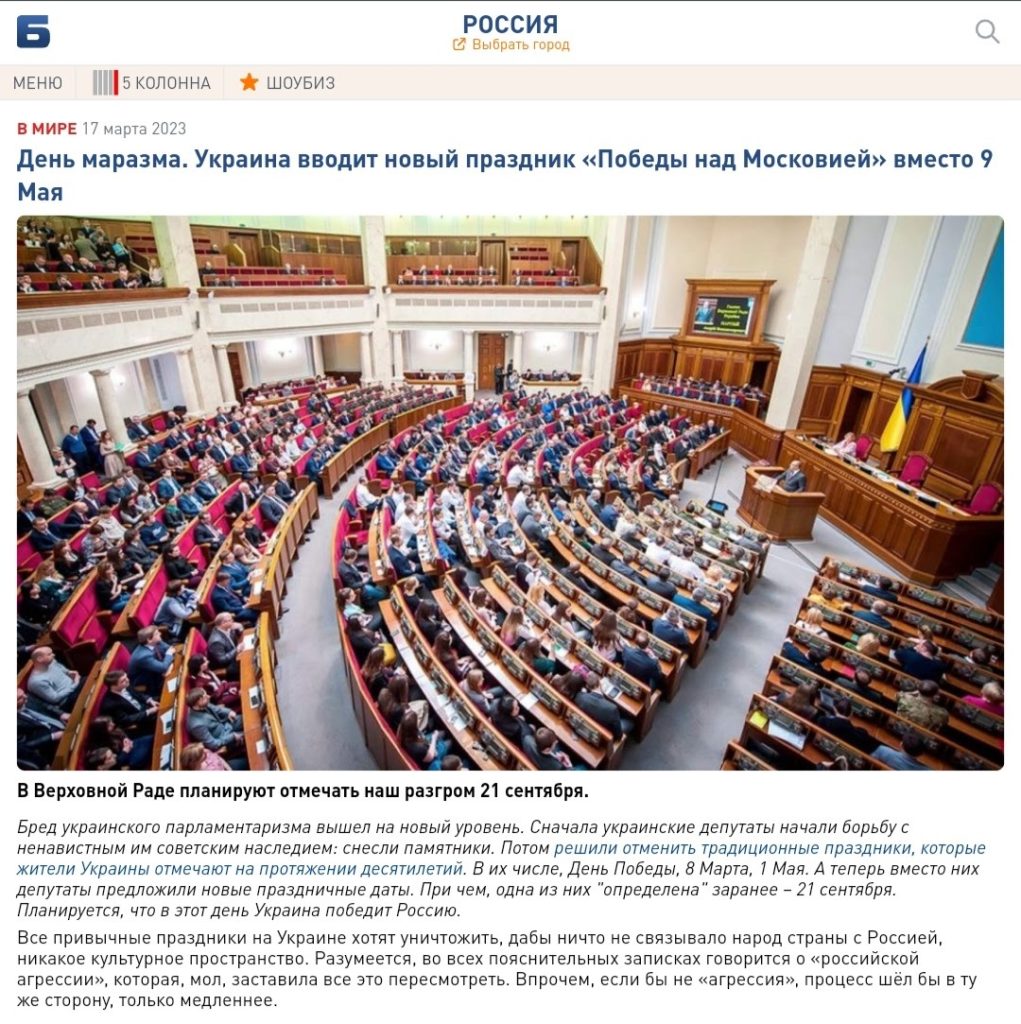
The messages concerning “May 9,” as a rule, strengthen the narratives about “Russophobia” and “Nazi policy” in certain countries.
For example, Latvia, Lithuania, and Estonia are most often targeted by messages about “Nazi countries,” which cancel “memorable days” and even “punish any attempts to violate it.”
In addition, Russian propaganda adds to it mentions of Ukrainians to provoke a hostile attitude, such as in a fragment from the 2022 publication of the Russian Baltnews, which is part of the Russia Today media group: “At the same time, literally by default, the anti-Russian aggression of some Ukrainians who arrived in Estonia is not considered a provocation, apparently.”

In addition, Russian propaganda does not stop trying to spread its basic narratives about World War II, which are also supported by the self-proclaimed President of Belarus Lukashenka. For example: “We remember all the innocent victims of the cynical experiments and the terrible cruelty of Hitler’s executioners. And we will not tire of reminding the peoples of Europe of those who put an end to the bloodiest war in the history of mankind.”
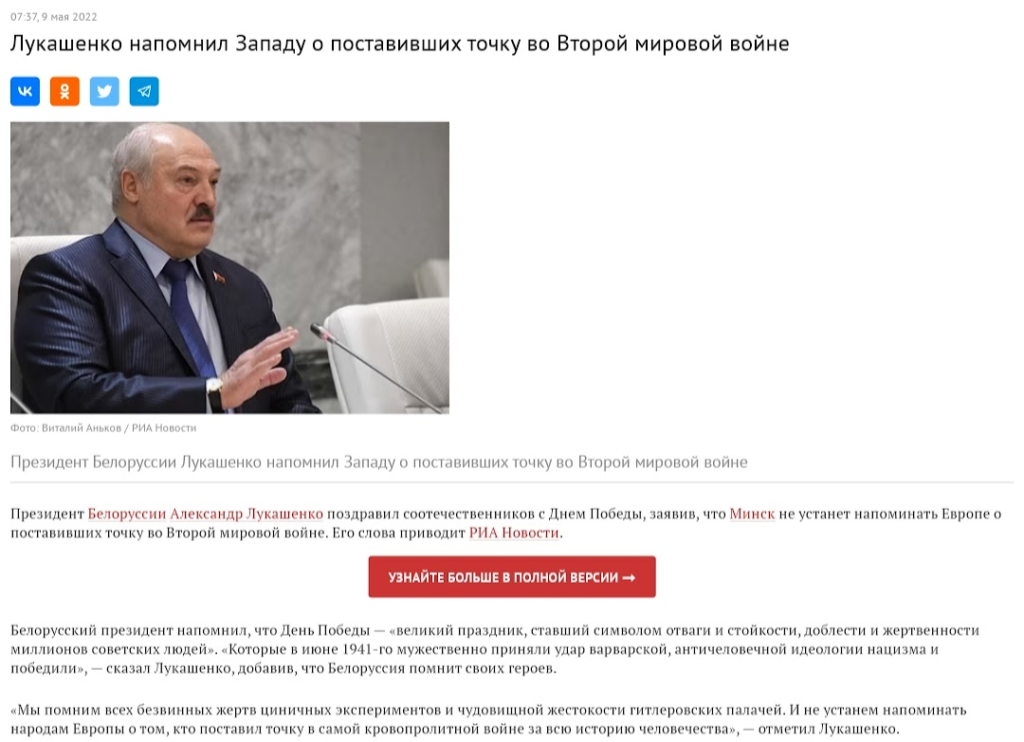
An example is the statement of the speaker of the State Duma of Russia, Vyacheslav Volodin, who said in 2022 that “the current generation of Western politicians wants to rewrite history and cross out the heroic act of the Soviet people in World War II.”
What is wrong with the Kremlin’s messages about “May 9,” and why Russia is not better than Nazi Germany?
With its messages, Russia seeks to monopolize the Victory, but the significant contribution of the USSR belongs to Ukraine and Ukrainians.
In addition, at the moment, it is Russia that is a Nazi state, which follows the Third Reich even in aesthetics, and the obvious parallels of the modern Russian-Ukrainian war with World War II are in no way in favour of Russia:
1) Hitler started the war because of his own imperial ambitions. Putin is also trying to revive the empire and seize Ukraine, which he considers his colony.
2) Nazi Germany, led by Hitler, waged a war of annihilation, committed genocide, and questioned the right of other peoples and states to exist. Russia is doing the same thing now, led by Putin. He claims that there are no Ukrainians, and the Ukrainian state has no right to exist.
3) Nazi Germany forcibly removed the population from the occupied territories. Russia is doing the same thing now. In March, the International Criminal Court issued a warrant for Putin’s arrest for kidnapping Ukrainian children.
What are the threats posed by Russia’s war against Ukraine?
Russia is destroying the post-World War II world order. If Putin is not stopped, the reality may become an even more terrible World War III.
In addition, the Russian president declared his enemy not only Ukraine, but the entire Western world (in fact, all democratic countries). According to his plans, Ukraine had to fall first and open the way for further aggression. If Putin is not defeated in Ukraine, he will attack other European countries, as Hitler did after the conquest of Poland.
History has proven that attempts to appease the aggressor only inflame his appetites. In the 1930s, the world turned a blind eye to the Anschluss of Austria and allowed Germany to dismember Czechoslovakia. Given the lack of a decisive reaction of the world to the illegal annexation of Crimea and the occupation of part of the Ukrainian Donbas, Putin was convinced that Russia would avoid punishment for unleashing a full-scale war. Only by uniting can the world stop it and prevent a new global war.
Centre for Strategic Communication and Information Security
If you have found a spelling error, please, notify us by selecting that text and pressing Ctrl+Enter.
